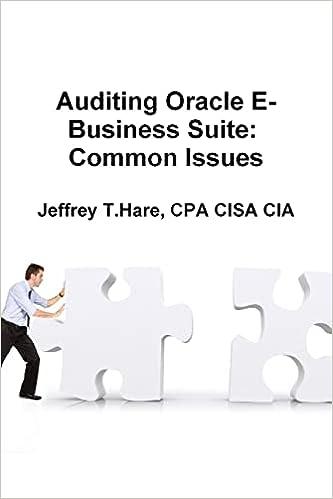Question
The stock of X is owned equally by two shareholders: Y (an individual with a stock basis of $100) and A (an individual with a
The stock of X is owned equally by two shareholders: Y (an individual with a stock basis of $100) and A (an individual with a stock basis of $40). X uses the accrual method, A and Y use the cash method, and all use the calendar year. Assume 1059 does not apply. Use a 34 percent corporate tax rate in this problem. X has always been an S corporation.
During the current year, X accrued income and expense as follows:
Gross income from business $500
Dividendes on AT&T (consider &243) $100
Interest on municipal bonds (&103) 100
Capital gain 100
Total $800
Deductible &162(a)(1) business expenses $430
Noncapital expense not deductible under & 162(e) $90
Capital losses (see &1211 (a) 146
Total $134
Alternative: A just bought the X shares on December 30 of the current year from another shareholder for FMV of $145, before the declaration and payment of a $5 distribution to A on December 31 of the current year. Should the distribution be taxable income to A? Why?
Now assume that Y's basis in its X stock is $100 and A's basis in his X stock is $40. On January 2 of the current taxable year, X distributions $100 in cash to Y and $100 in cash to A. As of the end of the preceding taxable year, X's accumulated E&P was zero. What are the tax consequences of this distribution to X, Y and A? Hint: First compute X's current year taxable income and then compute current year E&P before reducing the E&P for the distribution; after reducing for the distribution, compute final accumulated E&P.
Variation: How much dividend would Y and the holders of A's shares receive if A's shares were owned by a different shareholder every quarter and $50 was distributed ratably to all shareholders quarterly?
Suppose under the basic facts in (3) above that X had an accumulated deficit of $100 in its E&P account as of December 31 of the preceding taxable year.
Step by Step Solution
There are 3 Steps involved in it
Step: 1

Get Instant Access to Expert-Tailored Solutions
See step-by-step solutions with expert insights and AI powered tools for academic success
Step: 2

Step: 3

Ace Your Homework with AI
Get the answers you need in no time with our AI-driven, step-by-step assistance
Get Started


